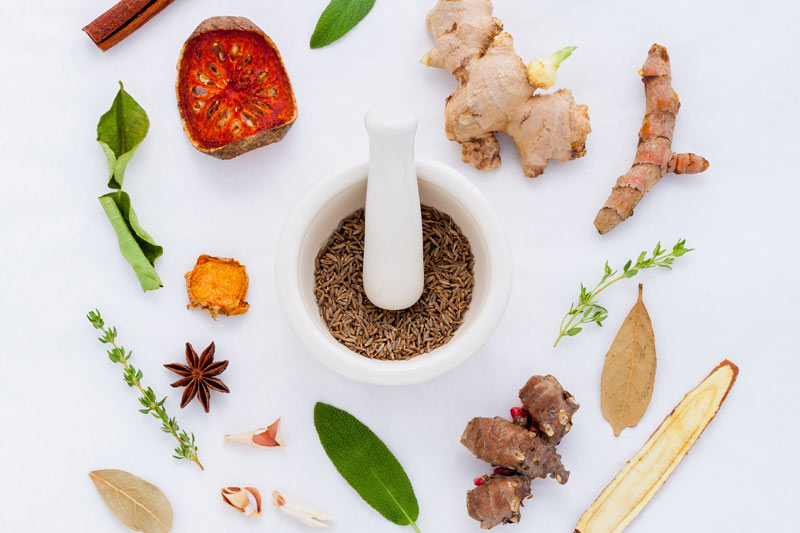
Herbal medicines have been used throughout history to treat a variety of medical illnesses and ailments. They are derived from different herbs due to their therapeutic properties. Today, herbal medicines can be found as tablets, capsules, powders, teas, extracts, or purchased in their plant form (fresh or dried).
Similar to acupuncture, many people turn to herbal medicines as a natural way to meet their healthcare needs. In many instances, these natural remedies can outperform modern medical treatments. And even those who are not looking to treat a specific illness may find that herbal medicines or supplements can help regulate their body’s natural immunity or improve particular functions (memory, sleep, etc.).
An overview of some of the most powerful and widely used herbal medicines include:
Turmeric:
Turmeric is a part of the ginger family, and it has a bright orange coloring. It is commonly used as a spice in India, and it is loaded with antioxidants. Turmeric has many therapeutic properties, as well. It is believed to have anti-cancer properties. It may also prevent certain DNA mutations. Turmeric also functions as an anti-inflammatory and is used for many individuals who have arthritis. It can also be used to alleviate pain and treat anxiety, dermatological conditions, and metabolic syndromes. But too much turmeric can be irritating to the system as it can cause diarrhea, headache, and skin irritation.
Gingko:
Also referred to as ginkgo biloba. It is a key herb found in Traditional Chinese medicine. Gingko is commonly used to slow the progression of dementia and Alzheimers, prevent heart and eye disease, spur bone growth, and treat sexual dysfunction, diabetes, anxiety, and depression. It is safe in small amounts but can cause possible side effects, including headache, heart palpitations, digestive issues, skin reactions, and increased bleeding.
Flaxseed:
Flaxseed or flaxseed oil are common dietary supplements that have been harvested for thousands of years due to their level of antioxidants and their anti-inflammatory benefits. Flaxseed can decrease obesity and inflammation, regulate blood pressure, and prevent colon cancer. It is also commonly used to treat hot flashes for menopausal women. It can be easily consumed by sprinkling it on any food you are eating. But be cautious to avoid raw or unripe flaxseed as they can be toxic.
Valerian Root:
The use of Valerian root goes back to ancient Greece and Rome. At that time, the root was used to treat restlessness, headaches, tremors, and heart palpitations. Valerian root is thought to induce tranquility and calm, and it is frequently used by those suffering from insomnia and anxiety. While it is generally regarded as a safe supplement, it can cause mild side effects, such as headaches and digestive problems.
Chamomile:
Chamomile has been taken in tea form to promote health for millennia. It is one of the most popular herbal medicines in the world. It is thought to relieve anxiety, stress, and insomnia. It is also used to remedy nausea, diarrhea, constipation, stomach pains, cramping due to menstruation, urinary tract infections, wounds, upper respiratory infections, and osteoarthritis. Chamomile may also have anti-cancer properties.
Echinacea:
Echinacea was initially used by Native Americans in North America. Its use dates back to the 18th century. It can treat a variety of medical issues, including wounds, burns, toothaches, bronchitis, upper respiratory infections, sore throat, and an upset stomach. It is also used to boost the body’s natural immunity and protect from getting colds. Echinacea can be consumed in a variety of methods, including in teas, juice, or as an extract, powder, or supplement.
Evening Primrose Oil:
Evening primrose oil is known for its anti-inflammatory properties. It can help with atopic dermatitis and diabetic neuropathy. Evening primrose oil may also improve patients’ quality of life with multiple sclerosis, regulating hormones, and insulin sensitivity.
Elderberry:
Elderberry is an herbal medicine that can relieve headaches, nerve pain, toothaches, colds, viral infections, and constipation. The plant it is derived from – Sambucus nigra – has antioxidant, antimicrobial, and antiviral properties. However, similar to flaxseed, elderberry should only be consumed in its cooked form. It is toxic when eaten raw or unripe.
While there needs to be more research exploring the efficacy of many herbal medicines, this list represents some of the most effective and established herbal medicines. When combined with other natural medicine, such as acupuncture, these remedies can work to promote health and wellness. It’s essential to ask your health care provider or research any supplement thoroughly before taking it, though, as side effect may occur if not taken properly.
https://www.healthline.com/health/ginkgo-biloba-benefits#takeaway
https://www.nccih.nih.gov/health/turmeric/
https://ods.od.nih.gov/factsheets/Valerian-HealthProfessional/
https://www.medicalnewstoday.com/articles/320031
https://www.healthline.com/nutrition/echinacea#dosage
https://www.verywellhealth.com/elderberry-for-colds-and-flu-can-it-help-89559
https://health.clevelandclinic.org/flaxseed-little-seed-big-benefits/
